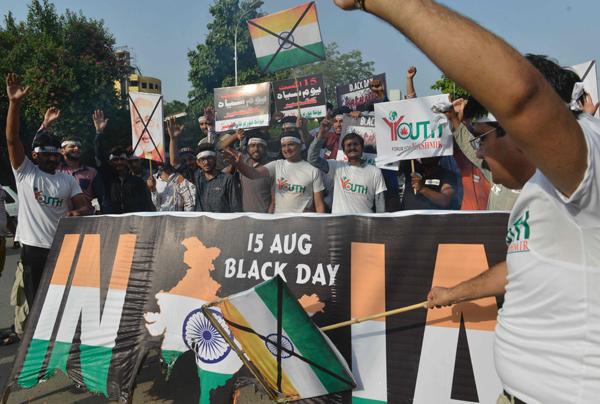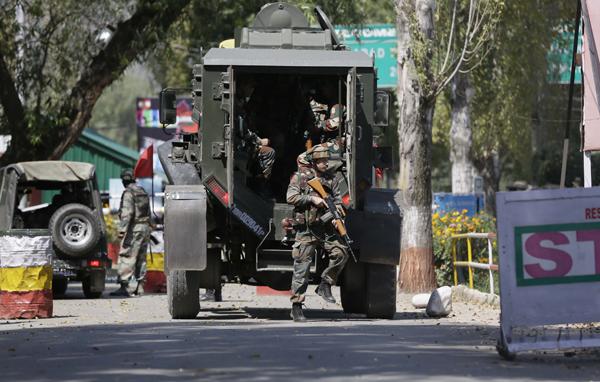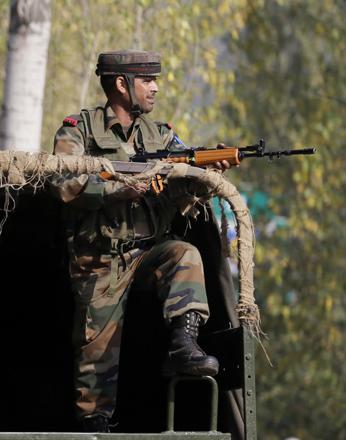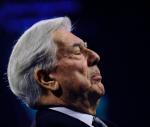You are here
India's Modi lashes out at Pakistan, Pakistan hits back
By Reuters - Aug 15,2016 - Last updated at Aug 15,2016

Pakistani protesters chant slogans and carry banners and placards during a demonstration on India's independence day, to show solidarity with Kashmiri Muslims in Indian-administered Kashmir, in Lahore on Monday (AFP photo)
NEW DELHI — Indian Prime Minister Narendra Modi took aim at supporters of "terrorism" in his independence day speech on Monday, ratcheting up criticism of Pakistan while avoiding direct mention of month-long protests in Indian-ruled Kashmir.
Modi also pitched a vision of national unity and progress in his third annual address from the ramparts of the Red Fort in Old Delhi that, at 94 minutes, was the longest delivered by the 65-year-old leader.
Yet it was a broadside against Pakistan, the archrival also born out of independence from Britain and partition, that left the strongest impression in a speech that otherwise focused on his government's achievements.
"What kind of life is this, inspired by terrorism? What kind of government setup is it that is inspired by terrorism?" asked Modi, who delivered the open-air address amid a security lockdown in the Indian capital.
"The world will know about it and that's sufficient for me."
Modi referred to messages of support he had received from people in regions of Pakistan, including the restive province of Baluchistan, drawing a rebuke from Islamabad which accused him of fomenting terrorism there.
Modi was "only trying to divert world attention from the grim tragedy that has been unfolding in the Indian Occupied Kashmir over the past five weeks", Pakistan's foreign affairs adviser Sartaj Aziz said in a statement.
Baluchistan's provincial capital, Quetta, was the scene of a suicide bombing on August 8 that killed more than 70 people and wounded at least 100 more at a hospital. A Taliban faction and Daesh terror group both claimed responsibility.
Kashmir raids
As Modi spoke, gunmen attacked a police station in Indian Kashmir's summer capital, Srinagar, killing an officer and wounding 10 police and paramilitary troops. Two militants were killed in the ensuing shootout, police said.
The army also said it had foiled an infiltration attempt from Pakistan into north Kashmir, killing three militants.
Kashmir has witnessed violent protests since a July 8 encounter in which security forces eliminated a commander of Pakistan-based Islamist militant group Hizbul Mujahideen.
As of Monday, at least 54 people had been killed and thousands hurt in clashes with security forces.
Modi met national party leaders on Friday to seek ways to end the worst unrest in Kashmir since 2010.
Both India and Pakistan rule Kashmir in part but claim it in full. The nuclear-armed neighbours have fought two wars since independence over the Muslim-majority region, where the Line of Control, or de facto border, runs roughly where the guns fell silent in 1948.
In a separate statement, Pakistan on Monday invited India for talks exclusively on the future of Jammu Kashmir — India's northernmost state. New Delhi has already ruled out such talks.
Analysts said the sharp exchange marked an escalation in the long-running rivalry between the countries.
Modi also referred to Pakistan-administered Kashmir and Gilgit-Baltistan, through which some of a $46 billion Chinese-backed trade corridor is expected to run, extending south through Baluchistan to the port of Gwadar on the Arabian Sea.
"Modi's statement is meant as much for Beijing as for Islamabad," journalist Prashant Jha wrote in an opinion piece for Indian newspaper Hindustan Times.
Modi's remarks directed at Pakistan overshadowed comments in his independence day address in which he touted his government's achievements in rural electrification, financial inclusion and health provision.
He strongly backed the fight against inflation, endorsing a 4 per cent target, within a range of 2 percentage points either way, agreed with Reserve Bank of India Governor Raghuram Rajan.
He barely mentioned his government's latest, and arguably most significant reform: the passage of a key amendment that clears the way for the introduction of a Goods and Services Tax (GST) next year.
He said only that the GST would "give strength" to the economy, while thanking opposition parties that, after a drawn-out battle, had come on board to pass the amendment unanimously through both houses of parliament.
Related Articles
PATHANKOT, India — Indian troops were still battling at least two gunmen Sunday evening at an air force base near the border with Pakistan,
SRINAGAR, India — India accused Pakistan of being behind a separatist attack on an army base near their disputed frontier on Sunday that kil
Srinagar, India — India's prime minister on Monday summoned top security advisers to thrash out a response to a deadly raid on a Kashmir arm


















